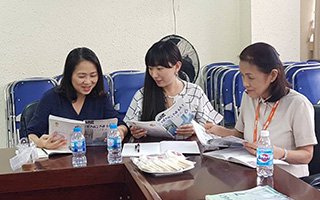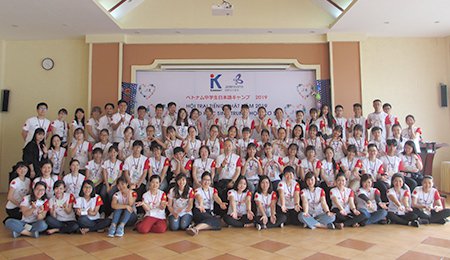2019 Japanese-Language Assistants’ Report: Japanese Language Education in Vietnam Never Stops Being Exciting
The Japan Foundation Center for Cultural Exchange in Vietnam
MORICHIKA Mina
The Japan Foundation Center for Cultural Exchange in Vietnam, to which I belong, is located in Hanoi, the capital of Vietnam, and was established in March 2008 as the Japan Foundation's fifth office in Southeast Asia. I would like to report on the work I have carried out over the period of about a year since I arrived in Hanoi in June 2018 to the present, May 2019.
A total of 10 people, including one Japanese-Language Senior Specialist, eight Japanese-Language Specialists (hereafter referred to as "Specialists"), and one Japanese-Language Assistant (hereafter referred to as "Assistant"), have been dispatched throughout Vietnam by the Japan Foundation. Especially because there are many Specialists in Vietnam, I work with them on a wide range of projects related to Japanese language education, and I am involved in many different projects. It is a great learning experience each day to hear about various ways of working and thinking and to receive valuable advice from each Specialist.
As an Assistant, I am mainly involved in secondary education. Currently, more than 90 junior high schools and high schools throughout Vietnam are offering Japanese language education, and the number of schools and students is constantly increasing.
New Learning Through Japanese Language
One of my main duties in secondary education as an Assistant is to provide classroom support to Vietnamese teachers teaching Japanese at junior and senior high schools in the northern cities of Hanoi and Haiphong. I also create teaching materials, check teaching plans and do other class preparations, and observe classes to provide feedback for improvement. I would like to share one episode from my work with you.
In Hanoi, there is a junior high school where general students and students with visual and hearing impairment study together, and Japanese language education is also provided there.
The teacher of the Japanese class said, "It is difficult for visually impaired students to read and learn from textbooks. How can they all improve their abilities together?" and asked for my advice.
I discussed with the teacher the best way for the students to learn. With the help of NIHONGO Partners, we started by making a vocabulary list (audio teaching materials) dubbed in Vietnamese and Japanese so that the students could study Japanese just by listening and without looking at the textbook.

Making audio teaching materials
This is just a small measure of support, but I hope that each such measure will lead to the future of Japanese language learning in secondary schools all over Vietnam.
I would like to continue to be accessible to Vietnamese teachers as I support them in meeting the various needs they face in the field.
New Challenges and Growth
What I find interesting about being an Assistant is that I am always able to take on new challenges. I can be involved in a countless variety of events and functions related to Japanese language education, such as teaching Japanese-language courses and training, judging speech contests, editing newsletters, planning and organizing major events. And I feel that all of these have contributed to my own learning.
Among these events, the one that is most fresh in my mind is the "Vietnam Junior High School Student Japanese Camp" (hereafter referred to as "Junior High School Camp"). As the Assistant, it gave me an opportunity to take on a new challenge: planning and management of the event.
The camp was attended by 51 junior high school students and 17 Vietnamese teachers from 32 junior high schools across the country where Japanese language has been introduced. The three days of activities were a chance for the students to demonstrate the results of their daily Japanese language study and also a chance to interact with students from all over Vietnam through the Japanese language. Vietnamese teachers were also involved from planning to the day of the event, and it was a valuable opportunity to experience with them the importance of the collaborative process.
In the future, I feel that it will be important for Vietnamese teachers to take the lead in creating a system that will allow them to become even more self-reliant by sharing their knowledge, experiences, and ideas with each other in activities outside the classroom, such as this Junior High School Camp.

The Vietnam Junior High School Camp 2019
Future Aspirations
Looking ahead, we will be holding the speech contest "Japanese Language Festival," and the "Nihongo-jin Forum (Japanese Speakers' Forum) 2019," an annual 10-day teacher training and exchange program for Japanese language teachers and high school students from five Southeast Asian countries, in Da Nang, Vietnam. I will have to take on even more work than I have had until now to prepare for these events. These are duties that I have no experience in, so I am constantly bewildered and anxious, but I believe that even more joy and growth will be awaiting me when our team accomplishes our goal.
I will do my best to support the spread and development of Japanese language education in Vietnam during my remaining year, always thinking about what is required of me in the moment.
- What We Do Top
- Arts and Cultural Exchange [Culture]
- Japanese-Language Education Overseas [Language]
- Japanese-Language Education Overseas [Language] Top
- Learn Japanese-language
- Teach Japanese-language
- Take Japanese-Language Test
- Know about Japanese-language education abroad
- The Japanese-Language Institute, Urawa
- The Japanese-Language Institute, Kansai
- Japanese-Language Programs for Foreign Specified Skilled Worker Candidates
- Japanese Language Education for Japanese Children Resident Overseas and for the Descendants of Migrants
- Archives
- Japanese Studies and Global Partnerships [Dialogue]
- JF digital collection
- Other Programs / Programs to Commemorate Exchange Year
- Awards and Prizes
- Publications
